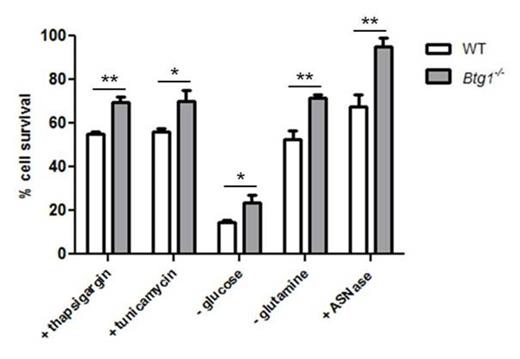Abstract
During the course of tumorigenesis and subsequent chemotherapeutic intervention, cancer cells experience various kinds of physiological stress, including hypoxia and nutrient limitation. Escaping cell death is one of the routes utilized by these malignant cells to allow continued growth and to acquire therapy resistance. B-cell Translocation Gene 1 (BTG1) is recurrently affected by genomic deletion in pediatric acute lymphoblastic leukemia (ALL) patients. Here, we define BTG1 as a mediator of the cellular stress response. When challenged with cellular stressors, such as amino acid or glucose deprivation as well as drug induced Endoplasmic Reticulum (ER) stress, mouse embryonic fibroblasts (MEFs) lacking Btg1 expression show a 20-30% increased survival rate relative to wildtype cells (Figure 1). Similarly, bone marrow B-cell progenitors isolated from Btg1 knockout mice are more resistant to Asparaginase (ASNase), a drug widely used in the treatment of ALL.
Activating Transcription Factor 4 (ATF4) is the master regulator of the stress response pathway that is activated upon nutrient limitation and ER stress. Importantly, loss of ATF4 function results in an enhanced survival almost identical to the effects we measured in Btg1 knockout cells. While ATF4 protein expression itself is not different between the genotypes, gene expression analysis revealed that the induction of a subset of ATF4 target genes (Ddit3, Atf3, Trib3, Gadd34, and Ndrg1) is significantly reduced in Btg1 knockout cells. As these genes are effectors of the apoptosis machinery, increased survival in the Btg1 knockout cells may reflect an attenuation of ATF4 function.
We hypothesized that BTG1 complexes with ATF4 to modify its function by recruiting Protein Arginine Methyl Transferase 1 (PRMT1). This enzyme, known to cooperate with BTG1, marks its substrate proteins with a post translational modification but has not been previously implicated in the regulation of ATF4 activity. Co-immunoprecipitation experiments indeed revealed a direct interaction between BTG1 and ATF4. We used purified proteins in an in vitro methylation assay to show that ATF4 is directly methylated by PRMT1 on arginine residue 239. Expression of the mutant ATF4 R239K, which cannot be methylated, in an ATF4 knockout background resulted in reduced transcriptional activity in response to stress relative to wildtype ATF4. In addition, we aimed to mimic the effect of BTG1 loss on the regulation ATF4 function by the addition of PRMT1 inhibitor AMI-1. Treatment of cells with this selective inhibitor faithfully recapitulates BTG1 loss by attenuating the induction of ATF4 target genes upon stress. Our findings establish the interplay of BTG1-ATF4-PRMT1 as a part of the cellular stress response. Taken together, our data indicate that BTG1 is necessary to maintain normal ATF4 function under cellular stress conditions. Loss of BTG1 expression, as it occurs during lymphoid leukemia development, may therefore provide a selective advantage for leukemic cells to survive and to resist treatment at a later stage of disease.
Btg1 is required for survival under cellular stress. Wildtype (WT) and Btg1-/- MEFs were challenged with different treatments that cause nutrient limitation and ER stress. A MTT based assay was used to study the metabolic activity of the cells as a measure of viability. The relative cell survival as compared to untreated cells (set as 100%) is shown. Bars represent average data from four independent experiments ± SEM. 2-tailed t-test was used to test for significance: * p<0.05, ** p<0.01.
Btg1 is required for survival under cellular stress. Wildtype (WT) and Btg1-/- MEFs were challenged with different treatments that cause nutrient limitation and ER stress. A MTT based assay was used to study the metabolic activity of the cells as a measure of viability. The relative cell survival as compared to untreated cells (set as 100%) is shown. Bars represent average data from four independent experiments ± SEM. 2-tailed t-test was used to test for significance: * p<0.05, ** p<0.01.
No relevant conflicts of interest to declare.
Author notes
Asterisk with author names denotes non-ASH members.


This feature is available to Subscribers Only
Sign In or Create an Account Close Modal